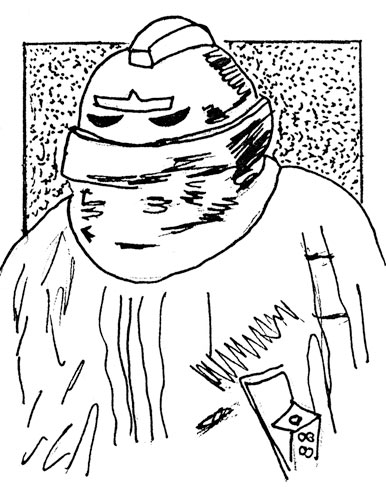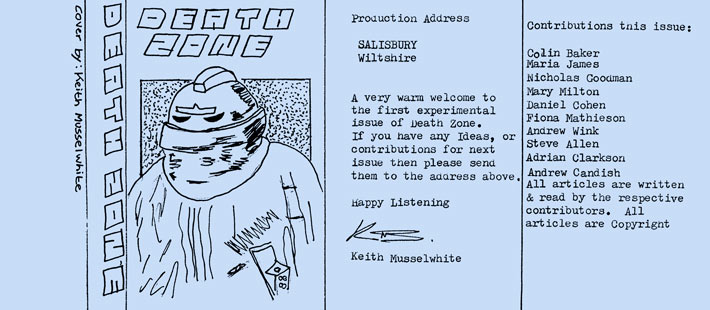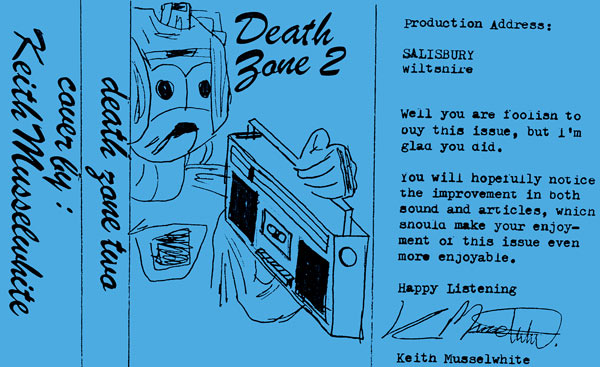|


Image © Keith Musselwhite, 1989
|
The Basics |
|
Place of Origin:
Salisbury, Wiltshire, UK
Editors:
Keith Musselwhite
In
Production:
1989 |
Distribution Media:
Audio Cassette
Tape Lengths:
#1-2: C-60
Issues Produced:
2 |

“Tell me,
what’s your favourite tapezine?”
“Death Zone!” intones a Philip Latham-flavoured Lord President
Borusa.
After much experimentation
with the tapezine format, Keith Musselwhite had produced five issues of
Meglos by early 1989. However,
its last two issues had been composed almost entirely of material
sourced from elsewhere due to the repeated demands from one particular
listener for “the next issue”. It was time for Keith to refocus and
rebrand. All he needed was an excuse...
Keith and fellow fan Nick
Goodman had been friends since early 1985, their love of Doctor Who
bringing them together at Highbury Secondary School in Salisbury. By
1989, Keith had entered the world of work and was employed in an estate
agency, while Nick was working in a large newsagent’s. The two friends
would meet regularly and exchange titbits of news. Early that June, Nick
revealed his plans for a Doctor Who project. Keith remembers his
reaction: “Death Zone was all Nick’s fault. He said ‘I’m doing a
tapezine.’ ‘Well, so am I, then!’ I declared.” And suddenly, not one,
but two tapezines were born.
This was typical of Keith
and Nick’s friendly rivalry. “Teenage Keith was enthusiastic and
competitive, sometimes to the point of abrasiveness – and I didn’t
always know how to react to this,” Nick confesses. “But I don’t think
his offer to rival what became
Rayphase Shift was a case of ‘My one’s bigger than your one’. It
was more ‘Let’s get into the sandpit and play’. He liked the idea that I
was entering the arena and wanted to have some fun, too.”
Keith sees things a little
differently: “I never really thought of myself as a rival, although I
can be competitive. There was always the thought in the back of my mind
that I could do a better job than I’d done with Meglos. So, when
Nick said that he was doing Rayphase Shift, it made me want to
try again.”
Re-energised, Keith had the
first issue of his new tapezine Death Zone completed and ready to
be duplicated by Tuesday 20th June 1989. By contrast, Rayphase Shift
was lagging behind. Nick had completed its first side within a 48-hour
period, having started on Thursday 8th June, but work was then held up
while he waited on further submissions. Death Zone was designed
to be Rayphase Shift’s twin, but ended up being its older
brother.
Far from being a rushed
piece of one-upmanship, Death Zone 1 set Rayphase Shift a
high standard to emulate. “Keith was completely in his element creating
this new brand,” Nick remembers, “and the choice of Death Zone as
a title was interesting as it was one of several that he considered when
he first tried to start a tapezine in 1985.”
“It was different to working
on Meglos because I had to write articles for it for starters,”
Keith observes. “Death Zone was perhaps a more confident version
of the earlier tapezine, now that I come to think of it. I’m amazed at
how little plagiarising there was and how much stuff I actually did
myself. I drew the cassette cover first of all – and since it featured a
Sontaran, it was a case of ‘I’d better write something about them to
justify it!’ So, there was that feature and three others, I think,
though I always preferred doing the linking stuff rather than the
articles themselves.”
The issue includes just two
recycled elements: Andrew Candish’s Logopolis review – which
dated back to the otherwise fruitless Time Rotor sessions of 1985
(and had been included on the first issue of Meglos) – and an
interview with Nick, conducted at the Leisure Hive III convention in
1986. “It’s quite sweet that that’s on there,” says Nick, “as it’s
probably the earliest recording of the two of us working together. I
come across as being rather dazed – it was my first convention and I had
a lot to absorb. You then hear our local group joining in and the
resulting banter. It’s a wonderful snapshot of the time. It previously
featured on Meglos Issue 2.” Currently, that issue of Meglos
is regarded as ‘missing, believed wiped,’ so this represents a surviving
sliver of it!
A similarly-themed feature
was contributed by Mary Milton, who visited the Salisbury group in
November 1987 to interview some of its members, focusing on the fans as
much as the show itself. The feature had a dual purpose – it would
feature on Death Zone but was also submitted as part of Mary’s
university coursework. It captures the mood of 1980s fandom and one
interviewee even states that, “I go to Doctor Who conventions and
things, but I don’t really like the series as it is now and I haven’t
really liked it for the last five years or so. Most fans feel this way –
or seem to feel this way – so most fans are going to conventions to
support a show that they don’t actually like in its current state, which
is odd, isn’t it?” Times change and yet, in many ways, they do not.
There was initially no
cross-pollination between Death Zone and Rayphase Shift.
At the time, Keith was co-organising the Shangri-La convention (which
was eventually held on Saturday 21st October 1989 in Reading) with
fellow fans Maria James and Heather Allen. “What with that and producing
Death Zone, it meant that I was too busy to offer to contribute
to Nick’s tapezine. From my perspective, Nick doing RPS was a
good thing. It just made me want to make a better tapezine than
Meglos.”
Nick, meanwhile, considered
that – since the two tapezines were friendly rivals – it would not be
appropriate to contribute anything to Death Zone. “Similarly,”
says Nick, “that’s the only reason why I didn’t ask Keith to contribute
to the first Rayphase Shift.”
While Nick waited for the
articles that he needed in order to complete the first Rayphase Shift,
the second Death Zone was on the launching pad. By this point in
time, the friendly rivalry that existed between Keith and Nick had
dispelled somewhat. “I was invited to contribute to Death Zone
2,” reveals Nick. “It was silly not to pool our resources, but then the
rivalry was never serious. Mind you, we both had fun scoring points off
each other within our respective creations – all in jest. I enjoyed
doing my two features for Death Zone 2.”
Keith contributed a review
of Season 26 to the second Rayphase Shift, which also carried a
commercial for Death Zone. However, Keith had completed two
Death Zone issues some two months before Nick managed to get
Rayphase Shift’s first issue past the post. Death Zone 2
debuted in August 1989 and copies were marketed at the Honeycomb
convention in Swindon.
At the end of Death Zone
2, Keith informed his listeners that the third issue would be a
Christmas special, available in December. Several initial pieces for the
special were recorded on Monday 18th September, using new microphones
that Keith had purchased. However, within the space of a few weeks, he
had decided that a Christmas special wasn’t quite special enough for him
– and that Death Zone needed a radio-style makeover...
The story continues!

Keith Musselwhite
would go on to edit
DZFM, which would prove to be
the final tapezine that Keith produced independently, though he did act
as guest producer for a single issue of
Rayphase Shift in 1994.
This was a natural progression as Keith was prolific contributor to this
tapezine from its second issue onwards, even participating in its
unfinished revival issue in 1999. His articles and reviews always
exhibited a lively combination of frank and acid comment mixed with
zany, often surreal, niche humour. Keith also contributed to Elaine
Bull’s Spotlight tapezine,
and could be heard in the ’zine’s drama, Sutton Park – Prison in the
Sun, which was a serialisation of a film that he had been involved
in. After a gap of several years away from the local stage, Keith
appeared in several films written and produced by Nick Goodman and
fellow Who fans and tapezine contributors Andy Ching, Andrew
Trowbridge and Lisa Parker. He later worked with Nick in the
transferring of many of these films to DVD, authoring the discs and
designing their on-screen menus and printed covers. His creative talents
are never far away.

Death Zone reveals an
editor who clearly loves his job and the programme and knows which
buttons to push. Reinvigorated by the chance to start over and do
better, Keith’s first issue swings along merrily and confidently, and
exhibits a cheeky friendliness that became the hallmark of his
productions. Death Zone 2 blossoms still further, with a faster
pace and more contributors. Both were lively and good-natured
productions. While his audience no doubt were keen to hear further
Death Zone issues, Keith strove for something even better, and
arguably the best was still to come in the form of DZFM.
Nick
Goodman

|
DEATH
ZONE – ISSUE 1
July 1989, C-60

Side
A:
-
Introduction by Keith Musselwhite
-
Review:
Logopolis by Andrew Candish (sourced from Meglos 1)
-
The
Fall and Rise of Doctor Who Magazine by Keith Musselwhite
-
It’s
Time to Put the Kettle On (Part 1): comprising (a) The Richard
Hurndall Rap by Daniel Cohen; (b) American Trailer –
Minneapolis ‘Two Doctors’ Doctor Who Event
-
Review:
The Ultimate Adventure by Keith Musselwhite
-
Interview: Nick Goodman at Leisure Hive III by Keith Musselwhite
(sourced from Meglos 2)
Side
B:
-
The
Sontarans by Keith Musselwhite
-
It’s
Time to Put the Kettle On (Part 2): comprising (a) James Brown’s
Sex Machine with Doctor Who clips by Daniel Cohen; (b)
You Thir! by Daniel Cohen
-
Interview: The Salisbury Doctor Who Local Group – Fiona
Mathieson, Andrew Wink, Steve Allen and Keith Musselwhite, by Mary
Milton
-
Review:
Remembrance of the Daleks by Keith Musselwhite
-
Commercial: Shangri-La Convention by Keith Musselwhite
-
Death Zone 1 Sign Off by Keith Musselwhite
DEATH
ZONE – ISSUE 2
August 1989, C-60

Side
A:
-
Death Zone Jingle by Keith Musselwhite
-
Review:
Earthshock by Elaine Bull
-
Review:
Doctor Who 25th Anniversary Album by Keith Musselwhite
-
A
Death Zone Greeting by Richard Franklin
-
Review:
The War Games by Nick Goodman
-
Death Zone Jingle by Keith Musselwhite
-
Contributions Request by Keith Musselwhite
Side
B:
-
Meglos
Jingle by Keith Musselwhite
-
Review:
Attack of the Cybermen by Nick Goodman
-
Convention Review with Excerpts: Panopticon IX by Elaine Bull
-
Death Zone 2 Sign Off by Keith Musselwhite
-
Review:
Doctor Who Tapezines (Dr. Who: Tapezine, UNIT
Tapezine, Sonic Waves, The Master Tape,
Meglos, Death Zone, Rayphase Shift) by Keith
Musselwhite
-
Death Zone 2 Jingle by Keith Musselwhite
|
|



